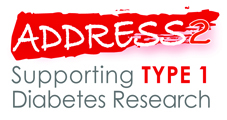ADDRESS-2 is now supporting a major European study aiming to improve the understanding of type 1 diabetes and and pave the way to new therapeutic options to prevent and cure the disease.
INNODIA: 
An innovative approach towards understanding and arresting type 1 diabetes
Recruiting to September 2021
Summary
Europe-wide study collecting blood samples and data from people newly diagnosed with type 1 diabetes and first degree relatives, aged 1-45 years.
Aim
To develop a European infrastructure for the recruitment of newly diagnosed patients with type 1 diabetes (T1D) and unaffected family members, generating an unrivaled Bioresource for T1D discovery science.
Contact us
Call: 01223 768616
Email: INNODIA-recruit@paed.cam.ac.uk
Website
Study outline
INNODIA will collect blood samples and data throughout Europe from newly diagnosed patients with type 1 diabetes and first degree relatives of people with type 1 diabetes to study and understand the development and progression of the disease. INNODIA participants will form a large European resource (living Biobank) where their samples can be analysed and used by scientists and doctors to further their understanding and help design clinical trials to arrest or stop type 1 diabetes from occurring.
We plan to recruit 1500 children and adults aged between 1 and 45 years who have been diagnosed with T1D within the previous 6 weeks and 3000 first degree relatives of people with type 1 diabetes, also aged between 1-45 years who may be at risk of developing type 1 diabetes in the future.
Eligibility to take part
Newly Diagnosed individuals with type 1 diabetes
1. Age 1-45 years
2. Diagnosed with type 1 diabetes in the last 6 weeks
First degree relatives of people with type 1 diabetes (unaffected family members)
1. Age 1-45 years
2. Have a first degree relative with type 1 diabetes (parent, child, full or half siblings) diagnosed less than 45 years of age
What will I/my child be asked to do?
Newly Diagnosed individuals with type 1 diabetes
The first visit will need to be within 6 weeks from when you were told you had diabetes and then at 3, 6, 12 and 24 months from diagnosis. At each visit you will have blood samples taken and a mixed meal tolerance test will be performed at visit 2 and at each visit until the end of the study. A mixed meal tolerance test can tell us how much insulin your body is still making.
Between the hospital visits and up until the end of the study we will ask for a tiny sample of your blood to be collected every 4 weeks by finger prick at home. We call these samples dried blood spots.
First degree relatives of people with type 1 diabetes (unaffected family members)
We will ask you to attend a screening visit which will take about one hour, where a sample of your blood will be taken for genes and autoantibody testing.
The results of these tests will be available within 3 months. Depending on the results you may or may not be invited for further study visits.
If your autoantibody results are negative
We will send you a health questionnaire, each year for 4 years or until the end of the study. We may ask you to provide further samples to compare results from people with type 1 diabetes and those from family members who do not have type 1 diabetes.
If your autoantibody results are positive
We will invite you to come to hospital for a further 7 study visits over 4 years. At each visit we will take blood samples and perform an oral glucose tolerance test which can tell us how good your body is at making insulin.
Between the hospital visits and up until the end of the study we will ask for a tiny sample of your blood to be collected every 4 weeks by finger prick at home. We call these samples dried blood spots.
Study locations
- Addenbrooke’s Hospital, Cambridge
- The Royal London Hospital, London
- Northampton General Hospital, Northampton
- Norfolk and Norwich University Hospital, Norwich
- Peterborough City Hospital, Peterborough
Who is running this study?
This study is sponsored by Cambridge University Hospitals NHS Foundation Trust and the University of Cambridge UK.
This project has received funding from the Innovative Medicines Initiative 2 Joint Undertaking under grant agreement No 115797 (INNODIA). This Joint Undertaking receives support from the European Union’s Horizon 2020 research and innovation programme and European Federation of Pharmaceutical Industries and Associations (EFPIA), Juvenile Diabetes Research Foundation (JDRF) and The Leona M. and Harry B. Helmsley Charitable Trust.
Read more about INNODIA.
Read about other studies we are supporting.
